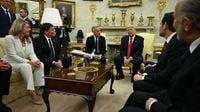In a significant meeting in Washington, Canadian Prime Minister Marc Garneau and U.S. President Donald Trump engaged in discussions about the future of trade relations between the two countries, amidst rising tensions over tariffs and cross-border disputes. The dialogue, characterized by a mix of politeness and underlying disagreements, highlighted the complexities of U.S.-Canada economic collaboration.
Initially, Trump praised Garneau for the Liberal Party's electoral victory in Canada, calling it "the greatest political comeback ever." However, the tone shifted as questions arose regarding the U.S. president's controversial suggestion that Canada could benefit from becoming the 51st state of the United States. Garneau firmly responded, stating, "Canada is not for sale," during a joint press conference.
Trump, while acknowledging Garneau's stance, retorted, "Don't say it can never happen," though he emphasized that discussions on such matters would only occur if there was a desire to do so. This exchange underscored the delicate balance both leaders must maintain in their diplomatic relationship.
As the meeting progressed, both leaders recognized the long road ahead in addressing trade issues. Trump hinted at the possibility of renegotiating the United States-Mexico-Canada Agreement (USMCA), suggesting that "it might need to be redone." Garneau echoed this sentiment, stating that "some things about it will have to change," and expressed optimism that "Canada-U.S. relations will get stronger if we work together." He reiterated his commitment to pursuing practical cooperation while affirming Canada's independence.
The backdrop of their discussions included recent retaliatory tariffs, with the U.S. imposing duties on Canadian goods in March, followed by Canada responding with tariffs on steel and aluminum products. Trump remarked, "We don't want cars from Canada, really," and cautioned that at some point, it may not make economic sense for Canada to continue producing certain goods.
When asked whether he would consider lifting tariffs on Canada, Trump simply replied, "No. That's how it is," indicating a firm stance on the issue. Garneau also touched on how Canada’s historical military reliance on the U.S. might influence trade dynamics, asserting that his government is committed to increasing defense spending. He framed Canada’s involvement as a partnership rather than a dependency, calling security a "pillar of the economic relationship" that both nations could benefit from strengthening.
Despite the contentious atmosphere, both leaders emphasized the enduring closeness of their countries, with Trump stating, "Canada loves us, and we love Canada." Garneau concluded that while discussions began with challenging topics, the real opportunities lie in partnership and what they can build together.
In a parallel development, the Canada Media Producers Association (CMPA) issued a warning regarding the potential severe impacts on the media production industry due to Trump's recently announced proposal for a 100% tax on all films produced outside the United States. This announcement, made on May 4, 2025, has raised concerns about significant disruptions and economic hardships in the media production sector on both sides of the border.
While the White House clarified that no final decision has been made regarding the proposed tax, the CMPA highlighted the potential for substantial challenges if such measures were implemented. The association stated that the uncertainty surrounding this proposal underscores the critical need for Canada to maintain a strong and independent domestic media industry.
In a statement, the CMPA remarked that, although the specifics of the proposal remain unclear, its implementation could lead to considerable economic strain in the media production sector in both the U.S. and Canada. They emphasized the importance of ensuring that Canada has a robust and independent media industry and plan to address this issue with regulatory bodies later this month.
As these discussions unfold, the backdrop of trade relations between the U.S. and Canada remains fraught with challenges. Both Garneau and Trump recognize that navigating these complexities will require careful negotiation and a commitment to partnership. With the potential for significant changes in trade agreements and media production policies, the coming months will be crucial for both nations as they seek to balance their economic interests while maintaining a cooperative relationship.
In summary, the recent meeting between Garneau and Trump reflects the ongoing complexities of U.S.-Canada relations, with both leaders expressing a desire for collaboration despite significant disagreements. The CMPA's concerns about proposed media taxes add another layer of urgency to the discussions, as both countries navigate the implications of their trade policies.




